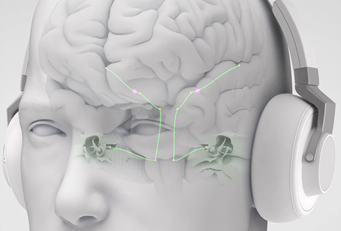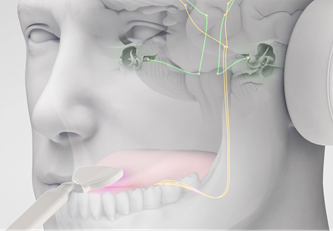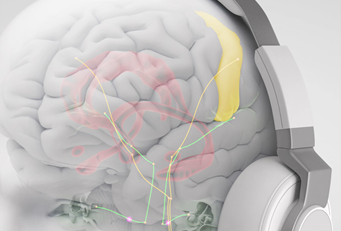Tinnitus is commonly known as ‘ringing in the ears’ but people can also experience it as a buzzing, roaring, humming, hissing, or even a clicking in their ears when there is no source of sound.
Regardless of the sound, this condition ranges from downright annoying to deeply distressing. A new treatment device which combines sound and tongue stimulation has been developed. It’s called Lenire and it has been clinically proven to soothe and relieve the severity of tinnitus.

If you have tinnitus, you’re not alone.
Tinnitus is a common medical condition estimated to affect between 10-15% of the global population. It’s a neurological issue which people experience as a sound or noise that does not have an external source. Although it’s more common in adults, it can affect people of all ages.
Tinnitus varies from person to person. For some it is a constant droning soundtrack to their lives while to others, it’s something which might only bother them at quiet times like sleeping or relaxing. In mild cases, it’s an issue that you can learn to live with. In cases where it’s more severe, tinnitus can result in significant stress, negatively impacting your quality of life.
The search for an effective tinnitus treatment
Due to the nature of this ‘phantom’ condition, which can be anything but phantom to those who experience it, finding a clinically effective treatment for tinnitus remains elusive. Recent polls show 60%* of tinnitus patients start their treatment journey by presenting to their Family Doctor. Family Doctors then refer patients to ENT Consultants who then refer to an audiologist. This lack of a standard for tinnitus care can lead to a cycle which tends to leave the patient feeling ignored and frustrated.
This can stop those suffering with tinnitus from seeking out treatment. In some surveys, 76% of tinnitus patients have never used any form of tinnitus treatment with almost 60% of patients not feeling informed about their tinnitus treatment options.*
Even though a cure has not been found, a medical technology company, Neuromod Devices, has developed a treatment device called Lenire that can relieve the severity of tinnitus. It is the first and only device of its kind approved by the US FDA for the treatment of tinnitus after being proven safe and effective in a large-scale clinical trial and with evidence from 204 real-world patients.
How Lenire works



Promising study results
The results of a recent large-scale clinical trial of the device, involving 112 people, and positive evidence from 204 real-world patients resulted in the US FDA approving Lenire .
80% of trial participants reported a clinically significant improvement in the severity of their tinnitus.
In three large-scale trials, 83% of more than 500 trial participants recommended Lenire for the treatment of tinnitus.
Find out more about the research behind Lenire here.
Real patient stories
Find out if Lenire is suitable for you
Lenire is now available throughout the USA. Want to find out more about it and see if you’re suitable?
Connect with a local tinnitus expert providing Lenire in their clinic by completing the form below. Once you complete the form, we’ll share your details with them and they’ll be in touch to answer your questions or schedule an appointment.
References
*Neuromod Market Research, 2021
1. TENT-A1 Conlon et al., Sci. Transl. Med. 12, eabb2830 (2020)
2. TENT-A2: Conlon et al., Different bimodal neuromodulation settings reduce tinnitus symptoms in a large randomized trial, Sci Rep.
3. TENT-A3: Clinical trial data in preparation for independent publication: clinicaltrials.gov/ct2/show/NCT05227365.
4. Aggregate: TENT-A1, TENT-A2, TENT-A3 aggregate clinical trial results.